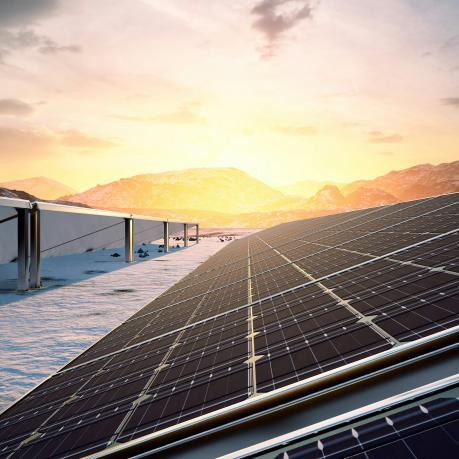
From ambition to implementation: delivering the energy transition and industrial transformation in 2026
Insight by Sandra Ghosh, Susanne Lein
Insight by Annika Kramer

Climate change challenges water security – and water security increases climate resilience. The topic of the World Water Day 2020 “Water and Climate Change” aims to highlight the immense impact that climate change will have on the availability of clean water – but also the crucial role that wise water management plays in adapting to and mitigating climate change. adelphi research investigates the complex interdependencies between water management and climate change and provides advice for policy-makers and practitioners to enhance climate resilience.
Water insecurity and climate change have spiralled up to the top risks facing humanity, as the World Economic Forum evidences in its recent Global Risk Report. Indeed, the two are closely interlinked. Water is the main medium through which climate change will manifest. As changes in the climate modify the hydrological cycle, some places increasingly suffer from water shortages while extreme rainfall causes havoc through floods in others. This will not only make it more challenging to provide society with clean water, it also endangers the achievement of various Sustainable Development Goals, from health and biodiversity to food and energy security. The drought plaguing Europe in 2018 or the “Day Zero” in Cape Town, South Africa, in 2019 are just two examples showcasing how a changing climate is taking its toll on water security. And yet, failure to curb water insecurity will make it equally impossible to achieve the ambitious objectives for adaptation and mitigation under the Paris Agreement.
Making it the topic of this year’s World Water Day sends the unambiguous message from the international water community: these two crises can only be solved together: While the mounting problems from each the water and the climate crisis seem daunting enough on their own, jointly tackling both offers many opportunities and can considerably increase the effectiveness of specific measures. An integrated approach has many benefits compared to solo action.
In our interdisciplinary research and consultancy work we currently focus on three fields of action where water and climate change need to be addressed together:
The vulnerability of water-dependent sectors to climate impacts hinges on how they manage water resources and water-related risks; sustainable water management will increase their climate resilience. Well-protected groundwater resources, for example, provide a strategic reserve for agricultural irrigation during droughts. Our analyses show that water-related climate adaptation (and indeed mitigation) action also provides co-benefits for food security or the environment. Failure of climate adaptation, in turn, can have dire consequences. Within the EU-funded project CASCADES, adelphi resarch analyses how climate change in regions outside Europe could turn into risks for EU trade, finances, and security. Building on impact chains like in Figure 1 below, it develops recommendations for policy-makers so they can prepare effective adaptation measures.
Many water infrastructures or river basins plans still go ahead without adequately taking into account climate risks. For many places, there are no precise predictions on how water-related climate change effects will unfold. Building dams or planning future water supply, therefore, need grounding in risk assessments that take into account uncertainties in future climate and water availability. As some uncertainty will always remain, adaptation measures need to follow designs that can either function under or be flexibly adapted to dynamic environmental (and also social) conditions. In a policy brief, we summarise the results of the project IMPREX on how using probabilistic forecasts can help to deal with uncertainties in flood risk management.
“If climate mitigation is about energy, climate adaptation is about water!” is a common quote. While this is largely true, a study we conducted for the Deutsche Gesellschaft für Internationale Zusammenarbeit (GIZ) highlights also the significant yet mostly undervalued role that water management can play in climate change mitigation. Sustainable water management is critical for sustaining carbon-rich water-dependent ecosystems like peatlands. Moreover, water-sector utilities can reduce energy use through more efficient technologies and exploit biogas derived from sewage. Most wastewater treatment plants in Europe, however, still squander heaps of energy, despite recent efficiency gains. Such is a key finding of the project REEF2W, where adelphi research examined how policies can spur the energy performance of Europe’s wastewater sector. Looking at the international climate policy arena, the Intergovernmental Panel for Climate Change (IPCC) neglects the mitigation potential from energy use for sewage treatment in recent reports. This prohibits these potentials to be considered in the National Determined Contributions (NDCs) of countries – the main pillar of the Paris Agreement.
The inextricable linkages between climate and water have long been recognized, yet only slowly does a shared vision make inroads into policy and practice. “We cannot afford to wait” is one key message attached to this year’s World Water Day. The 2018 special report by the IPCC, too, made clear that the window for taking action to curb global warming is extremely tight. However, water-sector institutions alone are barely able to drive climate adaptation and mitigation measures at the pace needed. Support from the climate community is critical, as our study for the GIZ stresses, for instance in helping water projects to become eligible for and tap into climate finance. Key policy instruments like the NDCs must acknowledge the important role of water-sector action in pursuit of climate-related targets.
Nevertheless, despite all urgency, rushing into action blindly can be fatal. Interventions require backing through rigorous science and careful planning. Hydropower, for example, while being the largest source of renewable energy globally, often causes high loss of biodiversity and destroys downstream livelihoods. Hence, climate mitigation targets can adversely affect other SDGs.
Contact: kramer adelphi [dot] de (Annika Kramer), mueller
adelphi [dot] de (Annika Kramer), mueller adelphi [dot] de (André Müller), taenzler
adelphi [dot] de (André Müller), taenzler adelphi [dot] de (Dennis Tänzler)
adelphi [dot] de (Dennis Tänzler)